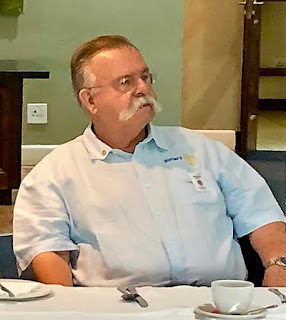 Last Week
Last WeekIt was a social meeting and a very enjoyable one. We had a number of visitors as well which enlivened the proceedings.
Marian Laserson was Sergeant and it was a great pleasure to see her after such a longtime. Here she is in studious mood.

Helmut Ogulin was a visitor from the Austrian Rotary Club of Bad-Fischau - Thermeregion. He presented President Jean with an almost blank banner!

A frequent visitor, David Craik from Sevenoaks in Kent, presented President Jean with a medal from the fun run that his club organises to raise funds. This does give her the opportunity to prove to others that she runs a lot, even overseas.
An increasingly frequent visitor was Nigel Bellamy from the Rotary Club of Selibe Pikwe in Botswana. He bears a striking resemblance to PDG Jankees Sligcher.
 |
| PDG Jankees Sligcher |
 |
| Rtn Nigel Bellamy |
Youth Exchange Weekend

Our Youth Director, Joan Sainsbury and Youth Committee member Cuthbert Gumbochuma attended with our potential Exchange Student, Masego Matiko.
District suggested that Masego look at Long-term rather than a Short-term Exchange and she decided during the weekend that that made more sense than the Short-term she had applied for.
Masego will be a brilliant ambassador for Rotary and South Africa as she has really made her mark at the SA School for the Arts. We wish her all of the best in this her Matric year. Last Year she took the leading role in an interesting radical play at school and if Matric doesn't hold her back we must support her in any performance this year.
This Week
It's a Business Meeting so we should hear more about what money we need to raise, what the expectations are regarding the Arts Festival etc.
Here's just a snippet of RI President-elect Mark Maloney's ideas on growing Rotary during his period of office starting on the 1st July.
President-elect Mark Maloney maps out a course for Rotary’s future
We need to grow Rotary. We need more hands doing service, more brains coming up with ideas. We need more partnerships, more connections. To accomplish that, I have four priorities for my presidency, and No. 1 is growing Rotary.
Q: How do you do that?
A: First, we redouble our efforts to support our clubs to attract new members and engage current members so that they stay with Rotary to perform greater and more innovative service. That means clubs being more flexible than they have been.
But the other aspect is to form new Rotary clubs. Our tradition was to form new clubs in areas where clubs didn’t exist. We need now to focus on forming new clubs where Rotary not only exists, but thrives. In many of those areas we are serving only a certain segment of the population. We need new clubs with alternative experiences that meet in nontraditional ways. That would help us attract a different demographic — be it age, gender, ethnic background — so that we are serving all aspects of the community.
Q: What are your other priorities?
A: My second and third priorities support the first. At every level of this organization we need to design our club meetings, service projects, and social events so they are family-friendly. We need to provide opportunities that complement younger individuals’ family lives rather than compete with those family lives.
And my third priority is that we must change our culture, our attitudes, and the way we do business so that it is possible and apparent that you can be actively engaged in Rotary and even assume positions of Rotary leadership while you are still actively engaged in your business or profession. If we want Rotary to be attractive to a younger demographic, we have to make Rotary leadership accessible to the younger demographic.
Q: What’s No. 4?
A: In June 2020, the United Nations will celebrate the 75th anniversary of the signing of the UN charter. Rotary has been involved with the UN since before the UN began. Because of that, I want to focus on Rotary’s relationship with the United Nations. The annual Rotary-UN Day will be returning to the UN headquarters in New York after having been in Geneva and Nairobi. We also hope to have three presidential conferences focusing on Rotary’s relationship with specific UN agencies at different locations around the world and a final celebration of Rotary’s UN relationship before the convention opens in Honolulu, Hawaii.
So in terms of legacy — just to wrap that up — for those of us who are working together in 2019-20, our success will not be measured on 30 June of 2020, but on 30 June of 2025 or 2030, when others can determine whether the things we started had an impact as the years went by.



































